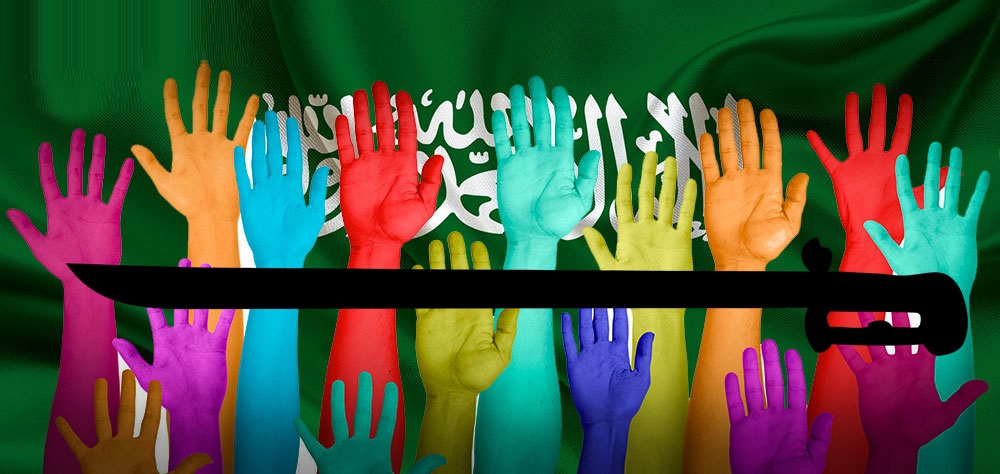AhlulBayt News Agency - Prince Salman bin Abdulaziz rose to power as king of Saudi Arabia on January 23, 2015, following the death of the former Saudi King Abdullah Bin Abdulaziz. Within a year, the Al Saud regime not only has not quitted its long-held domestic and foreign policies but also added to their aggressiveness. The inexperienced princes who took over administration of the country behind the scenes have not done too much to change the government’s policies at home. This is coming from the fact that Saudi Arabia’s political system is highly sensitive to any move for reform and change. Though it is said that the late Saudi King Abdullah was a reformist who did some measures to reform the policies, the new line of Al Saud rulers have done nothing for internal reforms. On the other side, the protests in Saudi Arabia have winded down almost two years ago as they lost their religious leadership. Due to fears of spark of new popular demonstrations, the government has immersed the country in "security atmosphere", and the Saudi military forces have had massive presence in areas where rallies were likely to break out.
In fact, Saudi Arabia's political milieu has moved to radicalism more than ever after new authoritarian and ideological government has seized the power.
The one-year developments of Saudi Arabia and its negative role in the region, including aggression against Yemen, support of the terrorist groups in Syria and Iraq and 2015 fatal Mina stampede, which took place due to Saudi officials' mismanagement, have made the Saudi regime a controversy across the region.As the procedure of formation of the decision making system of Saudi regime has come into attention in political and on social communities, specifically at home.
Saudi political system is a tribal form of governing in which the king is picked by a council comprised of the princes and the other members of the royal family. In the kingdom, the hereditary rule is an established right of the older sons of Al Saud family. The transfer of princes' place in Saudi Arabian political system could take place very rarely and even if there is a change in the kingdom's political system, it would happen in very superficial posts. Some believe that this form of government in Saudi Arabia could have roots in political and religious bonds between Al Saud and Wahhabism's teachings, political suppression, boosting the traditional civil institutions and lack of constitution. While today's world is a world of democracy and the globalization waves as well as fast-moving communications are persistently injecting political knowledge to the members of the society to help them determine their fate, how strongly could the non-democratic regime of Saudi Arabia weather the influences of globalization? Are the Saudi people mature politically enough to demand a key role in their country's politics and determination of their own government's form? To put it another way, how the people in this closed system of governing could accomplish their political and social roles?
It must be admitted that Saudi regime has failed to introduce principles to the country's political and social system to allow people practice their social rights. Saudi regime is one of the most fearsome regimes that pays not even the least attention to the people's rights and deprives the citizens of their legal freedoms. A lot of examples could prove this claim: Discrimination against the Shiite citizens- the regime executed the outspoken anti-regime Shiite cleric Sheikh Nimr Baqr al-Nimr-, massacring the children and women in aggression against Yemen, large-scale violation of internationally-approved principles of war, backing terrorism, violation of people's rights for determining their favorable form of government, violation of children's rights and ignoring the trial of the criminals, suppression of the sectarian minorities, putting limitations on social freedoms and freedom of speech, lack of freedoms of religion and beliefs, clamping down on the political opposition, systematic violation of human rights, overlooking the complaints of female prisoners kept in inappropriate conditions, lack of constitution, administration of the country based on royal family's interests, racial discrimination, depriving the religions minorities of their rights, setting limitations on women's education and on presence of women in public places. All these are cases of violation of human rights and civil freedoms conducted by Saudi regime specifically in recent years. These inhuman measures are the most obvious features of Al Saud which have directly or indirectly affected a large number of people in the country.
Studies on these features indicate that authoritarian Saudi regime, without doubt, is a leading violator of human rights and so far has failed to present justification or response for its cruel measures. Studies on the new line of Saudi rulers could substantiate this reality. In a time that the global tendency is moving towards valuing the human rights, the new Saudi rulers are seeking violation of human rights not only at home but also in other countries.
In such a condition it could be claimed that the emerging middle class in Saudi Arabia stands as the most significant class that could influence and challenge the current situation in the Arab kingdom. This class stood as a staunch back-up for the student protest movements, civil rights groups, feminist groups, environmental groups and disarmament groups in past few decades. Actually, self-awareness of this social class could shake pillars of conservative royal regime, encouraging the class to fight against the retrogressive regime. It takes people to know how their government operates and what role they play to determine their fate. But, working on propagation of political unawareness, the Saudi rulers have reduced the country to a graveyard of human rights that in many cases the continuation of this tendency could wreak havoc on the country.
/129
source : Al Waqt News
Saturday
23 April 2016
5:55:24 AM
749217

In fact, Saudi Arabia's political milieu has moved to radicalism more than ever after new authoritarian and ideological government has seized the power.
